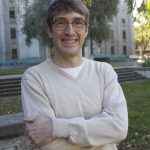Director
 Tobin White studies the use of technology in teaching and learning mathematics. He has a particular interest in using mobile computing to support novel approaches to engaging learners with STEM content and practices. Using a design-based research approach, he develops collaborative problem-solving tools and activities in order to investigate intersections between conceptual and social dimensions of learning. A former high school mathematics teacher himself, he has also worked for more than a decade in teacher preparation.
Tobin White studies the use of technology in teaching and learning mathematics. He has a particular interest in using mobile computing to support novel approaches to engaging learners with STEM content and practices. Using a design-based research approach, he develops collaborative problem-solving tools and activities in order to investigate intersections between conceptual and social dimensions of learning. A former high school mathematics teacher himself, he has also worked for more than a decade in teacher preparation.
Current Students
Jason Huang is a doctoral student with an emphasis in Math Education. His research interest is utilizing advancements in technology to investigate ways for engaging students’ motivation, enhancing students’ understanding, and improving teachers’ instruction in the mathematics classroom. Jason earned duel B.S. in Computer Science and Mathematics from Richard Stockton College of New Jersey, and M.Ed. in Mathematics Education from the University of Missouri – Columbia. He also taught a variety of Mathematics courses in Belton High School, MO for five years, including three years of college level courses.
Michael Stevens is a doctoral student with an emphasis in mathematics education. His research interests are centered on how students are thinking mathematically in collaborative spaces through the use of technology. Michael earned his B.A. in Mathematics and his M.Ed. in Education from UC San Diego, and his M.A. in Educational Technology from CSU Sacramento. He taught high school mathematics for 13 years, in both San Diego and Sacramento, and has also lectured an educational technology lab at CSU Sacramento for single-subject teaching credential candidates.
Alumni
Angelica Cortes received her doctorate in mathematics education from UC Davis in 2017. She currently teaches mathematics at Modesto Junior College. Her experiences as a first-generation community college student, an underrepresented mathematics major, a community college mathematics tutor, and a minority college instructor of developmental mathematics have greatly influenced her research interests. These include issues of social justice in mathematics, collaborative learning in mathematics classrooms, developmental mathematics at the college level, professional development of mathematics teachers, and college access and equity.
Lisa Hardy completed her PhD in the Learning and Mind Sciences at UC Davis in 2017. She is currently a research associate at the Concord Consortium. Her research focuses on technology-enhanced STEM learning, as well as in designing and developing technology-based learning environments for K-12 and undergraduate STEM classrooms. Lisa earned her M.S. in Physics at the University of Wisconsin, Madison, and her B.S. as a double-major in Physics and Biochemistry & Molecular Biology at UC Davis.
Kevin Lai received his doctorate in Education with an emphasis in mathematics education from the University of California, Davis. His dissertation focused on collaborative learning about geometry in the context of a CLICK design for student investigation of quadrilaterals. Kevin is now a research associate in the Mills College Lesson Study Group. He also worked as a postdoc in the WISE (Web-based Inquiry Science Envronment) group at UC Berkeley. His interests are mathematics education, technology, and student collaboration.
Scot Sutherland completed his PhD in the UC Davis School of Education’s Learning and Mind Sciences emphasis area. He is interested in the role of technology in mathematics education, and particularly in how technology can be used to investigate and monitor student learning processes in class. During his time at UC Davis, Scot worked on the design, development and investigation of software and activities for the CAREER and Collaborative Mathematics Learning with Robots projects.
Matthew Wallace received his doctorate in Education with an emphasis in mathematics education from the University of California, Davis. His dissertation research focused on how preservice teachers learn about, make sense of, and develop their own assessment practices while traveling through reform-minded teacher education programs. A former public high school teacher, Wallace’s research and teaching interests include classroom assessment and formative assessment in particular, reform-based mathematics curricula and pedagogy, race/ethnicity in education, preservice teacher education, and inservice teacher professional development. Dr. Wallace is now a member of the teacher education faculty at UC Davis.